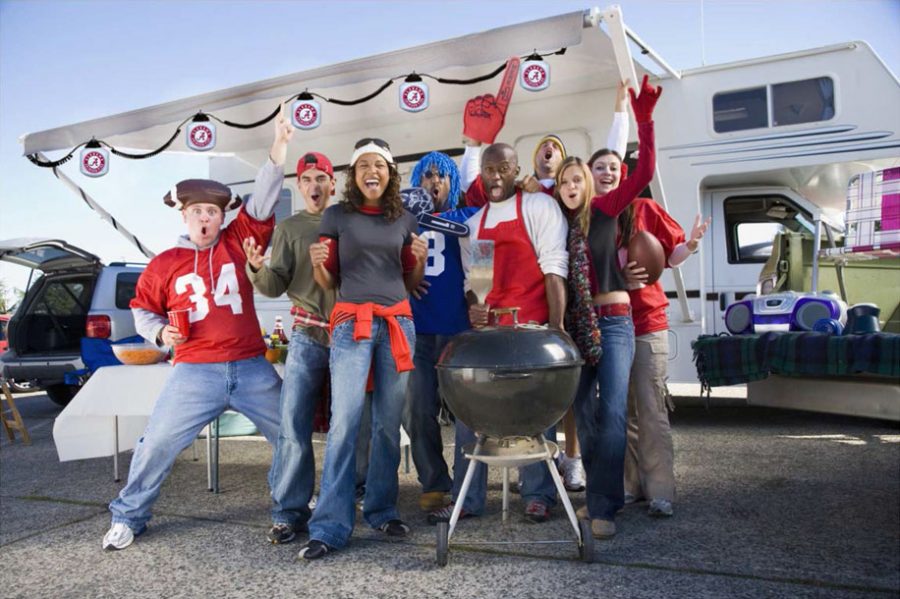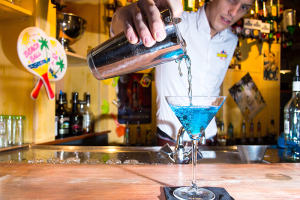CSUEB has blurry policy on alcohol
November 16, 2017
I went on a journey in search of information on how to have a tailgate at CSUEB: the ability to cook food, drink alcohol and socialize on campus before sporting events. Although that was the original intent of my inquiry, I ended up finding out just how confusing the CSUEB alcohol policy is in its current form and how it may be changed in the near future.
Having planned a tailgate to take place in a parking lot on the CSUEB campus, I opened up my search on Oct. 9 with an email to Tamika Owens, the head of Parking Enforcement. My message read, “Hello, I was wondering if we have any rules about tailgating in parking lots before athletic events.”
”We do not allow liquor, gas or electric grills in our lots (no cooking). You must leave the area clean,” Owens responded. “I hope this answers your question.”
This was the first sign that my search would not be as smooth as I’d hoped. I knew for a fact alcohol was allowed on campus because of dorm policies I learned during my freshmen year. After a bit of research I came back with a renewed argument.
“After reading the school policies on drinking on campus I am under the premise that if there is an approved event, an individual or club can get approval for it. But since this is not a club nor is this taking place at during and a club or school sponsored event, does that mean the rules pertaining to the consumption (not sale) of alcohol do not apply to this occasion?”
She responded by promptly transferring me to university scheduling.
Lucero Wallace, director of Scheduling and Rentals, opened the dialogue by stating, “CSU East Bay is a no-alcohol campus and as of Sept. 1 is a no smoke or tobacco campus as well. Since the athletic events are university-sponsored, then tailgating prior to these events would be considered out of compliance. The kinds of events that have an alcohol approval form on record are events where a particular space is rented out for a specific event. This then requires rentals fees, insurance, payment for UPD Officers to be present and Aramark is given the rights to serve/pour (sell) the alcohol.”
I wrote back: “Thank you for getting back to me! It seems to me that there is no language in the CSUEB policy in alcohol and other drugs that states alcohol is 100% banned from campus.” I expressed, “Section II even states that ‘the moderate consumption of alcohol may be an acceptable part of certain social activities.’”
After a day’s wait, Wallace congratulated me on my research before transferring me to James Carroll, the director of Student Conduct, Rights and Responsibilities. In his message, he provided answers similar to those by the first two departments. No grills unless in designated areas, we can tailgate as in hang out in the parking lot but can not play amplified sound, you can drink in housing but housing governs their own rules and Aramark must approve the event and serve the alcohol.
After a 20 minute phone conversation with Carroll, the issue turned away from “Can we tailgate?” to “What is our definite alcohol policy on campus and who holds the school’s liquor license?” From what Carroll explained, Aramark may control the school’s liquor license but we do not know how much control they have over it.
For next three days I called other CSU campuses that have specific tailgating and alcohol consumption policies. Having been advised to contact San Diego State as a source for answers because they had the “best policy in the CSU system,” my quest lead me to SDSU Facilities and Operations coordinator, Steve Bartel. He explained that they have tailgates and the school can do nothing about it.
Why? The city is in charge of the football events.
The SDSU Aztecs play football about nine miles west of the campus at Qualcomm Stadium, owned by the city, NOT by the school. Having said that, they couldn’t sell alcohol on campus; the sports that play on school grounds rarely have tailgates but football has tailgates because they are an off-campus space. For on-campus tailgates, an “auxiliary organization” connected to the CSU would have to apply for a special permit for the event prior.
Most importantly a member of the CSU Long Beach Risk Management Department, Felissa Waynick, pointed me towards recent legislation, CSU Executive Order 1109. The order “removes the prior prohibition on the sale and service of alcoholic beverages at athletic events, allowing campuses to decide if they wish to do so responsibly.” It goes on to explain that “any campus deciding to serve or sell alcohol at athletic events must first enact a policy governing such activity that contains certain minimum provisions.”
According to Carroll, “There is a group of us currently on-campus that are updating the policy so it reads more clearly and helpful.” He continued, “In fact, it is part of the Alcohol, Tobacco and Other Drugs Council, where departments are represented, including student reps from ASI.”
After speaking to the ASI director of legislative affairs, Parker Rugeley, on Nov. 14, I am certain that ASI has had no part in the making, nor has had representatives in the meetings pertaining to the alcohol policy. This begs the question, who are the members on the council and how much pull do they have in the making of this policy? All I know is that it seems as though CSUEB administration is not trying to let any details of this new policy out before completion. Don’t wait for the policy to finish before you give your say. The fate of alcohol on the campus may hang in a liminal space of confusion as of now, but if the students speak up, who knows what can happen.
Check out CSU’s official executive order here.








